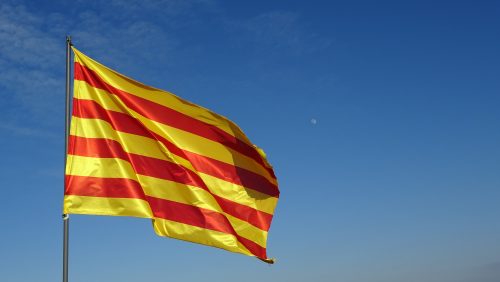Catalan Independence Movement
January 3, 2020 by Editor

By: Alexandra Lopez
On October 14, 2019, the Spanish Supreme Court tried twelve Catalan independence leaders. The Supreme Court found nine Catalan independence leaders guilty of sedition and sentenced them to prison for nine to thirteen years. However, they were not found guilty of rebellion, which would have resulted in a longer sentence of up to twenty-five years. The remaining three defendants were found guilty of the lesser crime of disobedience, which mandates the payment of a fine, rather than imprisonment.
Following this decision, protests immediately broke out in Barcelona, the capital city of Catalonia. Approximately 350,000 people protested the decision of the Supreme Court, while another 80,000 protested Catalan’s independence and supported Spanish unity. The protests marked the two-year anniversary of the Catalan Parliament’s declaration of independence.
Back in October 2017, Catalonia held a referendum to determine if it would separate from Spain. Though the votes for an independent Catalan came through, allowing Catalonia to declare independence from Spain, Madrid declared the referendum illegal as the Spanish Constitution does not allow for secession and cites the “indissoluble unity of the Spanish nation.” The Supreme Court agreed with Madrid’s decision last month by ruling that Catalan’s independence movement is illegal, noting the low voter turnout and lack of transparency around the results. The Supreme Court also rejected the Catalan separatists’ argument that Spain violated civil rights by failing to allow the referendum results to stand.
The Spanish Prime Minister, Pedro Sánchez, said that the ruling shows “an example of autonomy and transparency” and reaffirms that Spain is “one of the best democracies in the world.” Spain has a strong interest in maintaining its territorial integrity by not allowing one of its wealthiest regions to secede. Catalonia accounts for approximately sixteen percent of Spain’s population and nineteen percent of its gross domestic product (GDP).
The Supreme Court’s ruling has not seemed to deter Catalonian officials. Despite having just been sentenced to thirteen years, Oriol Junqueras, the former Vice President of Catalonia, said Catalan’s independence was “closer than ever.” However, current polls show that more than forty-eight percent of Catalonians oppose secession from Spain and only forty-four percent are in favor of secession.
Despite the Supreme Court’s ruling, the issue of Catalan’s independence is far from settled. The defendants plan to appeal their sentences to the European Court of Human Rights, and there is also a European arrest warrant out for Carles Puigdemont, the former President of Catalonia, who is residing in exile within Belgium. After many years, the fate of Catalonia is still very much unknown as separatists continue to support an independence movement despite Spain’s hardline nationalist stance.

